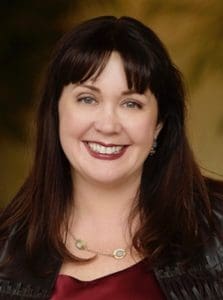While she was in Maryland recently for a conference, CCI caught up with Amii Barnard-Bahn, recently described by Forbes magazine as “one of the top coaches for legal and compliance executives.” Barnard-Bahn, a Fellow at the Harvard Institute of Coaching and a columnist for Compliance Week, was influential in steering the passage of California’s recent Bill SB826, the first law of its kind in the country requiring every public corporation to have at least one woman on the board by the end of 2019.
Barnard-Bahn is unequivocal: “The current board recruitment and selection process does not result in the most qualified candidates serving on public company boards.”
The board recruiting process typically goes something like this: when a board opening occurs (usually through death, term limits or retirement), the CEO and board members look to their personal networks for a replacement. Given that boards are 80 percent male, this closed process favors existing (and predominately male) board members’ personal networks over finding the most qualified candidates.
By the Numbers
This is a process problem, not a pipeline problem. Women currently comprise 51 percent of the US population, 57 percent of the workforce, and 56 percent of college students. In contrast, only about 21 percent of Fortune 1000 corporations have one or more female board members.
“We know by these numbers alone that companies are leaving top talent on the table if they are pursuing the old ‘friends and family’ strategy,” says Barnard-Bahn.
California has inspired other states, such as Illinois and New Jersey, in drafting their own legislation aimed at increasing the number of women on corporate boards. And Barnard-Bahn recently advised the Washington Women’s Commission on its strategy to increase board seats for women.
As a former Fortune 5 chief compliance officer, public company chief human resources officer, and chief administrative officer, Barnard-Bahn has a keen appreciation of the need for qualified, engaged board oversight of senior management. Pointing to the recent corporate crises at Theranos, Wells Fargo, and Facebook, Barnard-Bahn says, “We’ve seen too many examples demonstrating the risks when boards fail to effectively fulfill their oversight obligations. We know that board homogeneity leads to groupthink and complacency. And an overly chummy relationship with the CEO does not allow the checks and balances needed to stay innovative and ethical.”
The Power of Investors
Institutional investors such as Black Rock, State Street, and CalPERS agree with Barnard-Bahn. Over the past few years, these powerful institutional investors have pressured public companies nationwide to increase board diversity. Just last June, CalPERS made good on its diversity push, voting against 438 directors and 141 companies with all-male boards. Given that institutional investors hold about 70 percent of all traded stock of publicly held US companies, this type of activism will actually have a far greater impact than state legislation, Barnard-Bahn believes.
Investors are very serious about board composition, board tenure, and diversity of thought around the table, she says. “In the post-#metoo era, no one wants to be wearing the corporate dunce cap.”
More Than a Gender Issue
Barnard-Bahn believes that a disruption to the outdated board recruiting system, in parallel to opening the door for more women, will open the door for men who have traditionally been excluded from the privilege process as well.
Ultimately, says Barnard-Bahn, the Women on Boards movement isn’t only about gender. “At the end of the day, our goal is to have the most qualified board members serving our public corporations.“
“This is an opportunity for a much greater transformation, one that ensures our corporations are sustainably and profitably run. When companies fail, it has a tremendous trickle-down impact. Employees lose their jobs, investors lose money, and communities lose financial support,” summarizes Barnard-Bahn.
Getting on Board
For women interested in obtaining board positions, the following factors are critical: 1) possessing valuable corporate expertise, 2) cultivating a strong professional network, and 3) becoming board ready.
The first two of these require years of solid professional achievement, so planning ahead—as much as ten years or more—is a good idea.
With respect to board readiness, there are specific steps women can take to start their board search:
- Candidates need a tailored board bio that clearly and succinctly articulates their value proposition – their specific past corporate achievements and what types of companies stand to benefit.
- Board applicants need to identify their ideal corporate board “avatar” and create a list of target companies, identifying specifics such as the size and type of company, geography, and business strategy they are best at supporting.
- Many reputable organizations provide board training workshops around the country, and these can be extremely valuable in assisting prospective board members with preparing their bio and cultivating their target list of companies.
Yes, a board search can take many years, and that’s why Barnard-Bahn encourages professionals to start planning early.
However, the trend for new board seats is positive. As of just last month, there is a woman board member at every S&P 500 company. And some recent reports indicate that nearly 45 percent of new board appointees are now women.
Further, Barnard-Bahn points out that while corporate governance experts estimated that board gender parity would take 50 years to achieve naturally, “With interventions like we’ve seen recently, there is no way we are going to have to wait two generations to have more profitable, better governed companies. It’s very exciting.”
Ultimately, Barnard-Bahn is optimistic; she believes that most companies want to have a board that reflects their employee base, customers, and shareholders. “I’m not aware of any company that has only male customers, employees, and shareholders. It just makes good business sense.”

Amii Barnard-Bahn is an executive coach and strategic advisor who specializes in accelerating the success of legal, compliance and risk executives and their teams. She is an experienced C-Suite executive who has led strategy at Fortune 20 companies and nonprofits such as McKesson, Allianz and the California Dental Association for the past 20 years, leading multiple functions, including legal, compliance & ethics, human resources, IT, program management and communications. Now as an executive coach, Amii helps boards and leaders design exceptional work environments that enable organizations to out-behave and outperform their competition. Recent clients include Adobe, McKesson, Gilead Sciences, The Gap/Old Navy, Sabic Petrochemical, Chegg, The Nature Conservancy and York Risk Services Group.
Amii earned her law degree from Georgetown University Law Center and her Bachelor of Arts in English from Tufts. She is a Fellow at the Institute of Coaching, McLean Hospital – Harvard Medical School and a certified executive coach by the International Coach Federation.
Amii is a leadership columnist at Compliance Week and a favorite guest on the Compliance Podcast Network, covering CEO, board and governance best practices. A lifelong diversity advocate, Amii recently testified in multiple legislative committees on the successful passage of CA SB826, the first law in the U.S. requiring corporate boards to include women.













